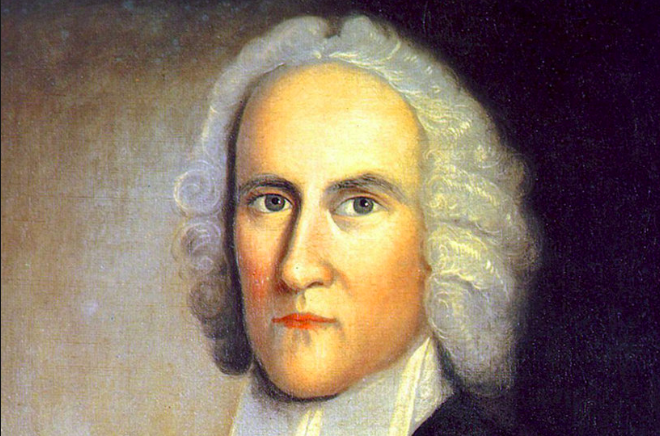What is “God’s Glory”?—Jonathan Edwards’ Theology
What is “the glory of God”? And, why is God’s glory so important?
Jonathan Edwards (1703-58), perhaps better than any other theologian, explains the meaning and significance of God’s glory. His book, The End for Which God Created the World argues, philosophically and biblically, that the ultimate end of God and of history is the magnification of God’s supreme glory.

The concept of “God’s glory” is central for honor-shame theology, as notions are “glory” and “honor” share strong overlap. For this reason, this post summarizes Edwards’ thought on the subject. The page numbers in citations below are from John Piper’s book God’s Passion for His Glory: Living the Vision of Jonathan Edwards with the Complete Text of “The End for Which God Created the World,” which is available as a free PDF.)
The notion of honor pervades Edward’s vocabulary. He repeatedly mentions glory (500x), name (169x) value (115x), regard (114x), praise (93x), esteem (61x) worthy (51x), and honor (30x). He could speak of honor eight different ways in one sentence, “If God’s own excellency and glory is worthy to be highly valued and delighted in by him, then the value and esteem hereof by others is worthy to be regarded by him” (p. 172). A rich variety of language was necessary for Edwards “to express things of so sublime a nature” as God himself (242).
Edwards claims, “All that is ever spoken of in the Scriptures as the ultimate end of God’s works, is included in that one phrase, the glory of God” (242). God does all things for his glory (191-210), for his name’s sake (210-14), for displaying his excellencies (210-14), and for his praise (218-20)—all synonyms of God’s chief end. The glory of God signifies “the emanation and true external expression of God’s internal glory and fullness” (242).
For Edwards, God is morally disposed towards his own glory. God “loves and esteems his own excellence,” “values the glory of his own nature,” and “testifies a supreme respect to himself” (150, 158, 159). This self-glorification is morally right because God “is worthy in himself to be so [respected], being infinitely the greatest and best of beings.” (140). God’s innate disposition towards honor is not “dishonorable to him” or “unworthy of God,” for “he should value himself infinitely more than his creatures” (168–71). His holiness “consist in giving due respect to that Being to whom most is due; for God is infinitely the most worthy of regard. The worthiness of others is as nothing to his” (141). His honor is neither ascribed nor achieved; his honor simply is, for all of eternity. God should, and does, seek his own glory.
God’s glory is not static, but actively overflowing into creation for eternity; the full manifestation of God’s glory necessitates a full process. Edwards explains the pervasive extent and full course of God’s self-glorification: “The beams of glory come from God, are something of God, and are refunded back again to their original. So that the whole is of God, and in God, and to God; and he is the beginning, and the middle, and the end.” Edwards explains how the Hebrew kabod and Greek doxa are used in each of these ways. Glory, the common translation of those words, involves three aspects: (1) internal excellency or worthiness for regard, a possessed value, (2) the public exhibition of his gracious goodness, a visible effulgence, and (3) the honor he receives from creatures, praise (229–39). In sum, God has glory, displays glory, and gets glory, forever.
God’s own joy in his glorious fullness disposes him to exhibit his glory in creation, so that his glory is further known and cherished by others. God “loves to have himself valued and esteemed” (150). “God’s glory should be known by a glorious society of created beings” and esteemed according to its dignity (149). This recognition of divine supremacy is God’s aim in creation and redemption. As the sun radiates light, God’s supreme glory overflows (246). God’s internal glory and fullness are communicated; he externalizes his innate excellency. God’s own delight in his internal glory disposes him to exhibit that glory in all things: providence, creation, redemption, and eternity (191–210).
Edwards argues how God’s glory and human happiness are one end and the same. Our joyous praising of God acknowledges and exhibits his glory (246). Or, “God is most glorified in us when we are most satisfied in him.” Salvation is receiving and returning the effulgence of divine radiance (246–47). Our delight and praise perfects the fullness of divine glory.
Our chief end as humans is to glorify God, as Edwards repeats in multiple ways. Our knowledge and happiness consists in regarding, esteeming, respecting, and exalting God as the chief good (249). Christian holiness means “the heart exalting, magnifying, or glorying God” (158). God is “pleased with the proper love, esteem, and honor of himself” (173).
The magnification of God’s supreme glory continues unabated into eternity. Edwards viewed the eternal state as “increasing union and conformity though eternity” (159–61, 249). Our knowledge and magnification of God’s glory will infinitely progress. God’s desire for his glory leads to “increasing communication of himself through eternity.” The end for which God created the world, has no end. His glory abounds forever.
Edwards, like no other theologian, offers a radical vision of God’s supreme honor in all things. From eternity past to eternity future, the ultimate end of all things is the glory of God. Edwards provides a philosophical and biblical anchor for a Christian theology of God in honor-shame terms.

If anyone likes Edwards and is interested in honor/shame, may I highly recommend reading two chapters from John Owen: “Pneumatologia or, A Discourse Concerning the Holy Spirit,” Book IV, Chapters IV [https://www.ccel.org/ccel/owen/pneum.i.viii.iv.html] and V [https://www.ccel.org/ccel/owen/pneum/pneum.i.viii.v.html].
Owen is by no means easy reading. But if you work through it a few times, you may well find those two chapters to be the most important Biblical exposition you have ever read.